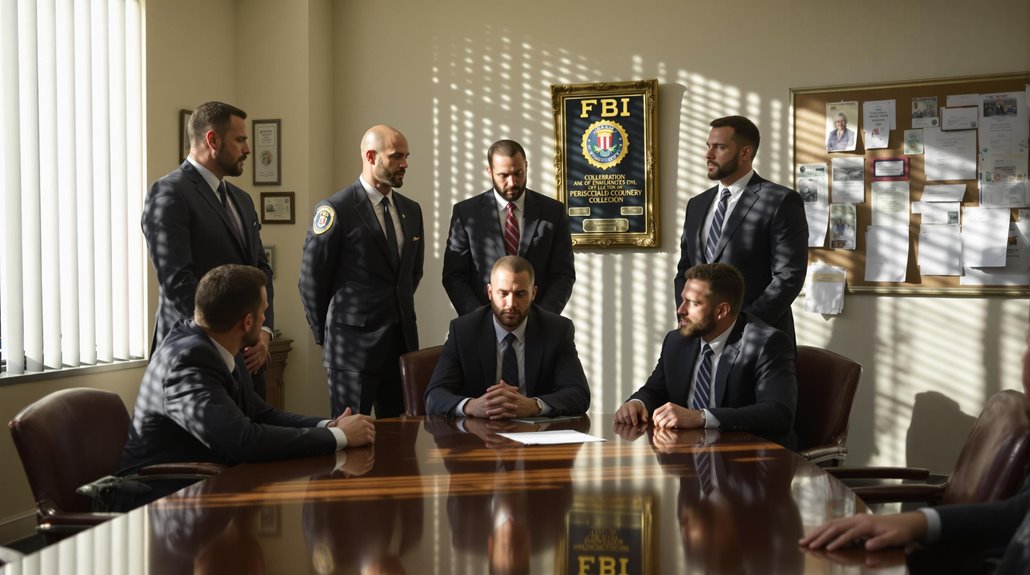Did Ancient Greeks Wear Beards?
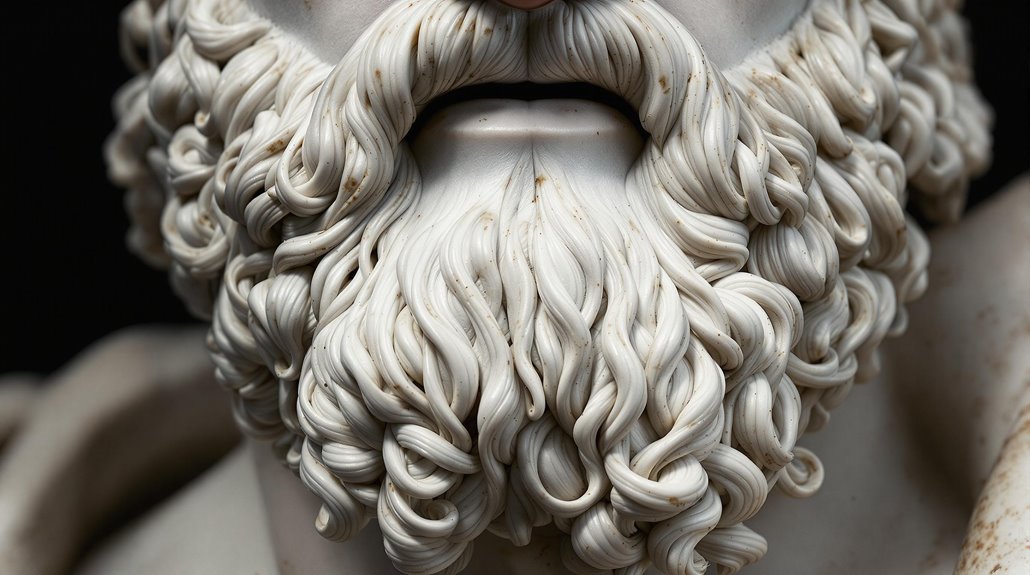
Yes, the Ancient Greeks not only wore beards but also held them in high esteem. In their society, facial hair was a badge of manhood and wisdom and also relayed one's social status and philosophical affiliations. Great philosophers like Socrates sported them as symbols of intellectual prowess. Regular grooming was key to maintaining a well-kept appearance. However, Alexander the Great brought a shift, ordering soldiers to shave to prevent enemies from using beards as a grab-point in battles. Want to know more about what styles were popular or how they maintained them? Keep exploring, there's much more to uncover!
Beard Significance in Ancient Greece
Delving into the world of ancient Greece, you'd quickly identify the importance of beards in their society. More than just a fashion statement, beards were loaded with symbolic meaning. They were seen as badges of masculinity, wisdom, and social status. For ancient Greeks, your beard wasn't just hair on your face; it was a reflection of your intellectual identity and beliefs.
Styles varied, and affiliating with specific philosophical schools often meant adopting a particular beard style. Your beard told others where you stood on life's big questions. However, the rise of Alexander the Great marked a shift in grooming preferences. Alexander ordered his soldiers to shave, fearing that enemies might grab their beards in battle. This practical move led to a decline in beard popularity among soldiers.
Yet, beards remained a significant part of Greek culture until the influence of Roman customs, which favored clean-shaven faces. Shaving during mourning was also customary, again underlining the cultural significance of beards in expressing personal and communal identity. In the world of ancient Greeks, your beard spoke volumes about who you were and what you stood for.
Greek Philosophers and Facial Hair
While the cultural significance of beards in ancient Greece is clear, it's also worth noting the impact they had on philosophical identities. As you explore history, you'll find that prominent philosophers, including the likes of Socrates, were renowned for their bearded appearances. This wasn't a mere fashion statement; beards were potent symbols of wisdom and intellectual prowess.
Different styles of beards even hinted at one's affiliation with specific philosophical schools. You can imagine how a philosopher's beard was a visual shorthand, signaling their intellectual stature and beliefs to their contemporaries. Beards were seen as emblems of pride, respect, and maturity, contrasting sharply with the later Roman preference for clean-shaven faces.
Art and literature further reinforced these associations, often depicting philosophers with impressive beards. This not only cemented the image of philosophers as wise, bearded figures in the public imagination, but also underscored the cultural importance of facial hair as a marker of intellectual status. So, in understanding the relationship between Greek philosophers and beards, you're not just learning about ancient grooming habits, but also getting a glimpse into how these men communicated their identities and beliefs.
Alexander the Great's Influence on Beards
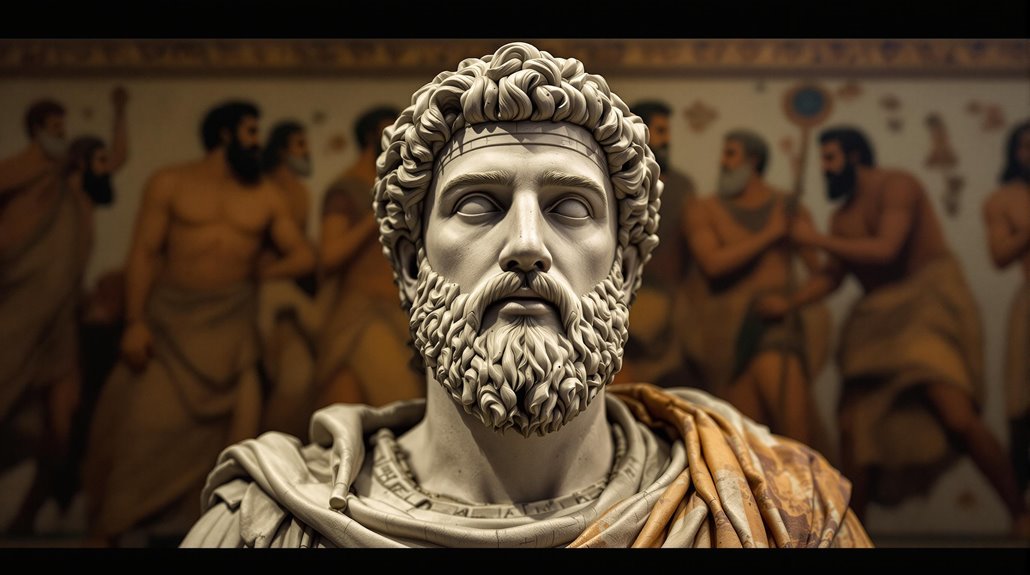
Despite the deep-rooted tradition of beard-wearing in ancient Greece, Alexander the Great ushered in a seismic shift in grooming practices. You see, beards were once symbols of masculinity, wisdom, and status. Especially among philosophers, beards were a common sight. But Alexander, ever the tactician, saw beards as a liability in battle. Imagine an enemy soldier grabbing your beard mid-fight - not an ideal situation.
So, he mandated his soldiers shave their beards. This was more than just a military decree; it was a cultural revolution. The once-popular beard soon fell out of favor among the general populace, who began leaning towards a clean-shaven look. Only philosophers and intellectuals maintained their beards, a nod to the old ways.
This shift in grooming practices can be traced directly back to Alexander's influence. He didn't just change the face of warfare; he changed societal norms regarding facial hair. So next time you're shaving, remember: you're not only practicing good hygiene, you're also following a trend set by Alexander the Great himself. The demise of the beard's popularity in ancient Greece? You can thank (or blame) Alexander for that.
Comparing Greek and Roman Beard Traditions
Reflecting on Alexander the Great's radical grooming rules, it's remarkable to observe the striking contrast with the Romans' take on facial hair. While beards were a mark of masculinity, wisdom, and social standing in ancient Greece, the Romans had a different view. They saw smooth, clean-shaven faces as signs of civilization and wealth, particularly under the influence of Emperor Nero.
In the Greek world, prominent figures like philosophers were often depicted with beards. It was a source of pride and identity, a symbol of their manhood. However, Roman boys and men celebrated the initial shave as a rite of passage into adulthood.
You'll also find practical reasons behind these grooming preferences. Greek soldiers, for example, had to shave before battles to prevent enemies from grabbing their beards.
Interestingly, around 300 B.C., the Greek beard traditions began to decline, coinciding with the rise of Roman shaving practices. This shift shows how the significance of beards evolved over time, reflecting not just personal choices but also broader cultural and societal norms. So yes, ancient Greeks did wear beards, but their beard traditions were quite different from their Roman counterparts.
The Symbolism of Beards in Warfare
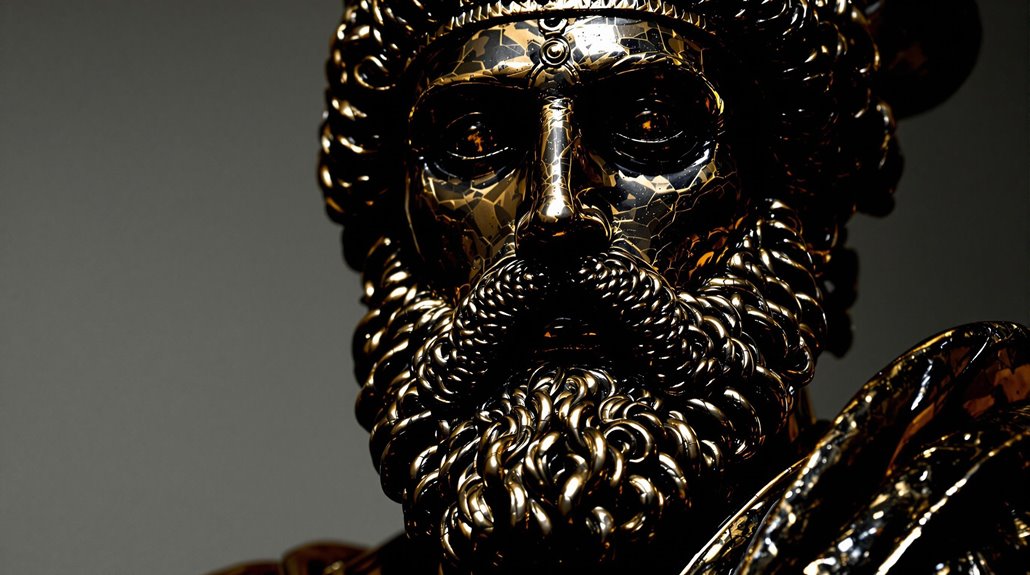
Imagine standing on an ancient Greek battlefield, your beard serving as a potent symbol of wisdom, masculinity, and bravery. In ancient Greece, your beard was more than just facial hair—it was a badge of honor, a mark of your valor. Beards were revered and held a significant place in Greek society. They were linked with wisdom, masculinity, and maturity, especially amongst philosophers and citizens.
When preparing for war, Greek soldiers often kept their beards, testifying their bravery. Yet, there was a practical side to this tradition. Alexander the Great, the famous Greek king, strictly ordered his soldiers to shave their beards before battles. Why? It was a strategic move to prevent enemies from grabbing their beards, thereby gaining an advantage in combat.
Interestingly, it wasn't common for a Greek man to cut his beard unless he was mourning or had suffered a loss, underlining the emotional connection that ancient Greeks had with their beards. This symbolic significance of beards, interwoven with the ideals of masculinity and honor, was deeply entrenched in the Greek military ethos.
Importance of Grooming in Greek Culture
In ancient Greece, beards were not just about masculinity and wisdom, but also about grooming and personal appearance. Every whisker and strand of facial hair was a reflection of one's character and social standing. While you might think that grooming practices were trivial, they were far from that in Greek culture.
- Symbol of Status: A well-groomed beard was a sign of prestige and respect. It indicated a man's social status and his intellectual prowess.
- Social Hubs: Barbershops were not just places for a trim or a shave. They were venues for hearty discussions on philosophy, politics, and other community matters.
- Ritual Significance: Shaving held a ritual significance, especially during the rites of passage. It marked the shift from boyhood to manhood.
- Grooming Tools: The Greeks used diverse grooming tools to keep their beards neat and tidy, highlighting the value they placed on personal appearance.
Ancient Tools for Beard Maintenance
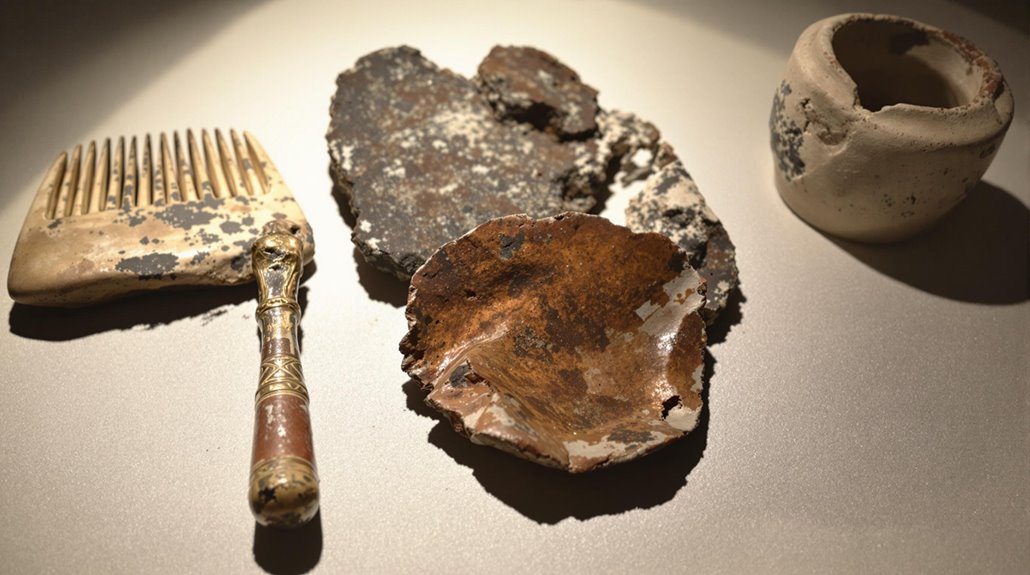
Consider the significance of your grooming tools. Now, picture a time when sharpened stones and shells fulfilled these functions. For bearded men in ancient Greece, these primitive instruments were essential for maintaining their facial hair. Grooming wasn't merely about aesthetics; it reflected societal status, making tools like these irreplaceable.
Barbers, or κουρεύς, were esteemed figures, expertly wielding scissors and razors for trimming and styling. They were the guardians of grooming, their barbershops lively hubs for beard maintenance techniques and discussions.
Not every hair was welcome, however. Stray hairs were handled with care, using depilatory ointments and tweezers. This practice demonstrates the ancient Greeks' appreciation for well-groomed beards, further emphasizing the significance of their grooming tools.
But it wasn't solely about beards. The Greeks' grooming regimen was all-encompassing. Specialized instruments, known as ὀνυχιστήρια, were employed for nail grooming. This holistic approach to personal care is a reflection of the careful grooming standards they upheld, where even beard maintenance was a matter of precision, highlighting the importance of their simple yet effective tools. Indeed, the ancient Greeks' grooming tools and methods were as polished as their philosophies.
Variations in Greek Beard Styles
As you investigate deeper into ancient Greek society, you'll uncover that beards were more than just a fashion statement. They symbolized pride, masculinity, and wisdom, and their style could even hint at the wearer's philosophical affiliations.
- The full beard: This was the most prevalent style. Often well-groomed, it emphasized a man's status and intellect. Along with long hair, it created an image of a noble, wise man.
- The philosopher's beard: Philosophers and intellectuals typically sported longer beards. This distinct style became associated with specific schools of thought, enhancing the intellectual stature of the wearer.
- The young man's beard: Younger men and soldiers often had shorter, more practical styles, or were clean-shaven, a reflection of their youth and role in society.
- The Alexander effect: With the rise of Alexander the Great, beard popularity declined. He mandated that his soldiers shave their beards for practicality in battle.
Each style told a story, revealing an individual's identity and status. Beards, in ancient Greece, were not just about aesthetics; they were a significant aspect of a man's persona.
Modern Perceptions of Ancient Greek Beards
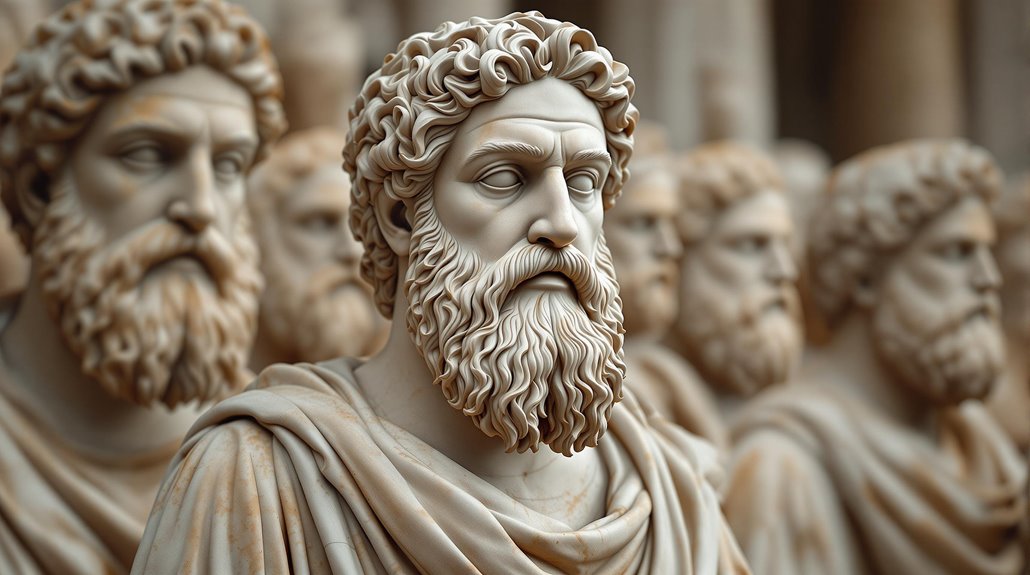
Shifting our focus from the historical variations in Greek beard styles, we now examine how they're perceived today. You may imagine ancient Greeks as bearded philosophers, thinkers, or warriors, an image largely influenced by their depictions in literature, art, and historical records. It's essential to keep in mind that these beards were not merely fashion statements. They represented wisdom, masculinity, and philosophical beliefs, making them potent symbols of identity and status.
But it's not all about the beards. Alexander the Great's mandate for soldiers to shave their beards for practical battle reasons has left a strong impression too. This clean-shaven look, adopted by the elite and military classes, signifies a considerable cultural shift.
Today, these perceptions endure. Beards, as a trait associated with Greeks, continue to signify masculinity, wisdom, and philosophical thought, underlining the immense influence of ancient Greek culture on modern societal norms. However, the image of the clean-shaven Greek soldier also persists, reminding us of the practicality that sometimes overrides symbolic meaning. Therefore, your understanding of Greek beards today is a blend of historical significance, practical considerations, and enduring cultural influence.



